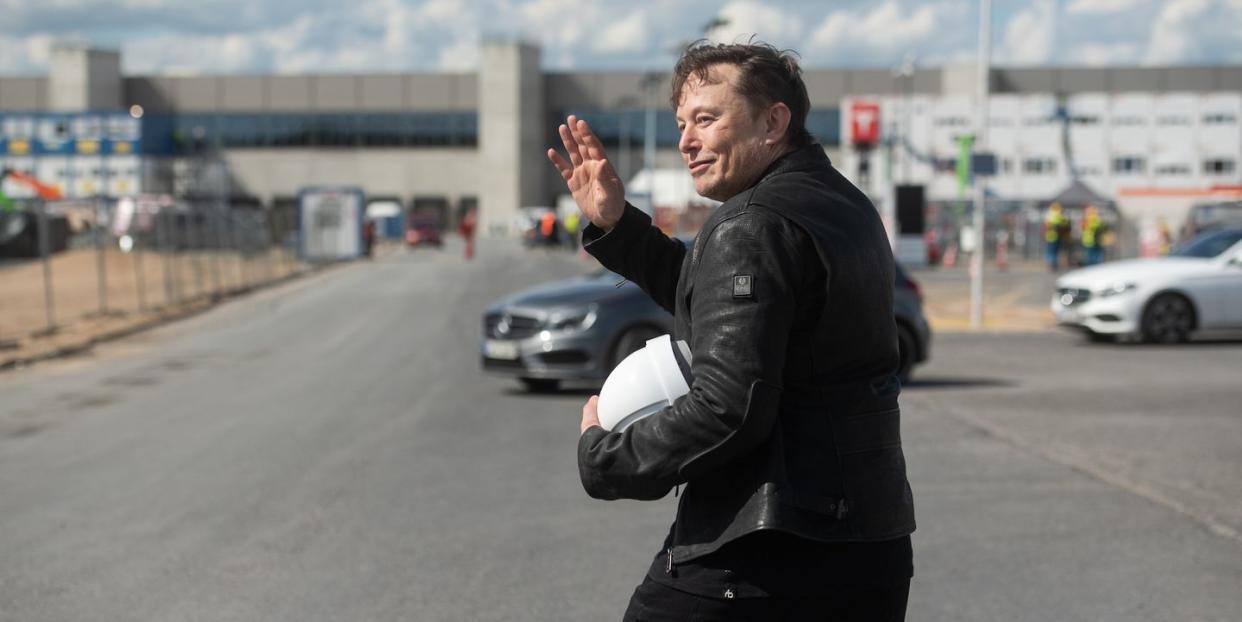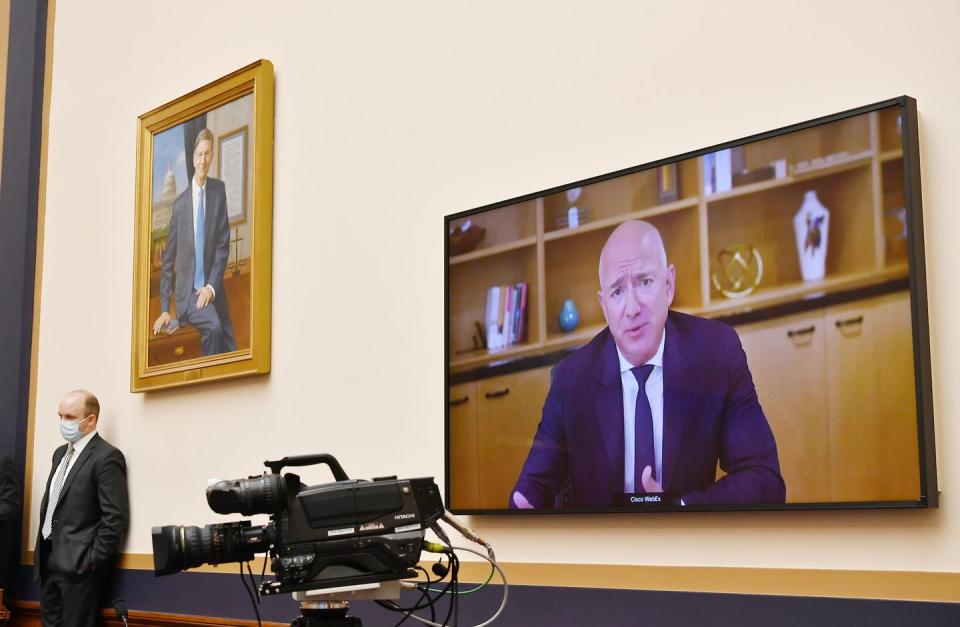America's Oligarchs Are Operating in Financial Disneyland

Sometimes you get the feeling that a lot of our discussions around taxes basically amount to reassigning state rooms on the Titanic. There's broad support for raising taxes on the rich, but they are often not playing the same game as the folks in steerage. Raising the top income tax rate back up from 37 to 39, as President Biden has proposed as part of his American Families Plan, is basically nonsense. These unofficial aristocrats do not make their money on wages like commoners, and that top tax rate does not apply to them. If you needed this driven home, ProPublica was kind enough to do so with a stunning new report on how the ultrarich pay taxes—or not. It doubles as an X-ray machine into the body politic of the Second American Gilded Age, where rampant inequality might just be taking our country apart at the seams.
To start, here's a top-line takeaway:
Our analysis of tax data for the 25 richest Americans quantifies just how unfair the system has become.
By the end of 2018, the 25 were worth $1.1 trillion.
For comparison, it would take 14.3 million ordinary American wage earners put together to equal that same amount of wealth.
The personal federal tax bill for the top 25 in 2018: $1.9 billion.
The bill for the wage earners: $143 billion.
But of course, everybody likes an infuriating personal example. Here's Ground Control to Major Bezos:
In 2011, a year in which his wealth held roughly steady at $18 billion, Bezos filed a tax return reporting he lost money — his income that year was more than offset by investment losses. What’s more, because, according to the tax law, he made so little, he even claimed and received a $4,000 tax credit for his children.
His tax avoidance is even more striking if you examine 2006 to 2018, a period for which ProPublica has complete data. Bezos’ wealth increased by $127 billion, according to Forbes, but he reported a total of $6.5 billion in income. The $1.4 billion he paid in personal federal taxes is a massive number — yet it amounts to a 1.1% true tax rate on the rise in his fortune.
Wow! Nice work, Jeff! That $4,000 credit is a little reminiscent of Donald Trump's $750 tax bill in that, while in actual numerical terms it is not significant, there is something intergalactically galling about it. But back to our astronaut: Just pay zero taxes! Why do you need to extract money from normal people who pay theirs? A silly question, I suppose, for a guy so determined to extract labor out of his employees that their humanity is often tossed by the wayside.
And then there's Warren Buffet, vocal champion of tax reform who presents himself as almost theatrically transparent on the issue, even rolling out his Secretary Tax line at regular intervals. Buffet has, in fairness, said people like him are undertaxed. But he may have been underselling it a bit.
No one among the 25 wealthiest avoided as much tax as Buffett, the grandfatherly centibillionaire. That’s perhaps surprising, given his public stance as an advocate of higher taxes for the rich. According to Forbes, his riches rose $24.3 billion between 2014 and 2018. Over those years, the data shows, Buffett reported paying $23.7 million in taxes.
That works out to a true tax rate of 0.1%, or less than 10 cents for every $100 he added to his wealth.
.1 percent. But it's nice that he lives in that same house he always has, or whatever.
Maybe the most valuable part of the work here from Pulitzer Prize-winning reporter Jesse Eisinger, along with Jeff Ernsthausen and Paul Kiel, is that the piece breaks down how this happens in very clear terms. In short, most people make their money on standard income—wages or salary—that is taxed to the fullest extent under the law, usually right when they make it. To some degree, they might grow their wealth through owning a home. Rich people, especially the superrich, make their money through really owning things—primarily, property and stock. But they prefer to keep these assets as assets rather than sell them, which would create "realized gains" that can be taxed.

Instead, they keep them as unrealized gains. In some cases, they take out credit lines—loans—against their vast holdings, using them as collateral. The loans are usually not considered income by the IRS, so when Oracle's Larry Ellison has "a credit line secured against $10 billion of his shares" in Oracle, he's operating in financial Disneyland. He has little or no money for tax purposes, but unlimited money for his own purposes. "Last year," ProPublica tells us, "Tesla reported that Musk had pledged some 92 million shares, which were worth about $57.7 billion as of May 29, 2021, as collateral for personal loans." As if to drive home the value of this arrangement, the report reminds us these guys often make a big show of not taking a salary at their day job. But like with our recently former president, this is a charade. They don't need the salary because they make their money in other ways. They don't even want the salary, really. That's taxed like normal people get taxed.
All this is to say that the system is working exactly as designed: to allow people who already control a hugely outsized share of the capital to keep as much of it as possible. And raising the top marginal income tax rate will not do a damn thing about this. Biden and his Democratic allies in Congress have proposed a couple of things that will begin to hack away at this problem, particularly the president's suggestion that we tax capital gains—income from investments—like regular earned income for people making more than $1 million a year. He's also backed expanding the IRS budget to the tune of $80 billion over 10 years, which would help the agency actually police wealthy tax evaders rather than spend much of its time, as it currently does, auditing poorer people to investigate their use of the Earned Income Tax Credit. But again, most of this stuff is perfectly legal. It's how the system was designed.
For unlimited access to Esquire's political coverage, including an exclusive weekly newsletter from Charles P. Pierce, you can join Esquire Select here.
With that in mind, it's hard to look beyond a wealth tax. Various Democratic presidential candidates last time around crafted proposals along the lines of, say, Elizabeth Warren's, where wealth over $50 million would be taxed at two cents on the dollar, and wealth over $1 billion would be taxed at three cents. Implementing this would pose some challenges: Would the people this applies to have to sell off stock or other assets to meet their annual wealth-tax obligations? How would the IRS evaluate a person's total wealth? But it has to happen in some form. The kind of wealth currently controlled by Jeff Bezos alone is quite literally incomprehensible to the human brain. All this is on the back side of things, where these guys already have the money. Our society will also have to make some changes on the front side, taking on the massive firms some of these guys control using antitrust statutes and building their workers' ability to take a bigger piece of the pie through union membership and, ideally, worker presence on corporate boards. But we also need to do something about their functionally unlimited resources at a time when ordinary people are barely scraping to get by—and still actually paying their taxes.
You Might Also Like

